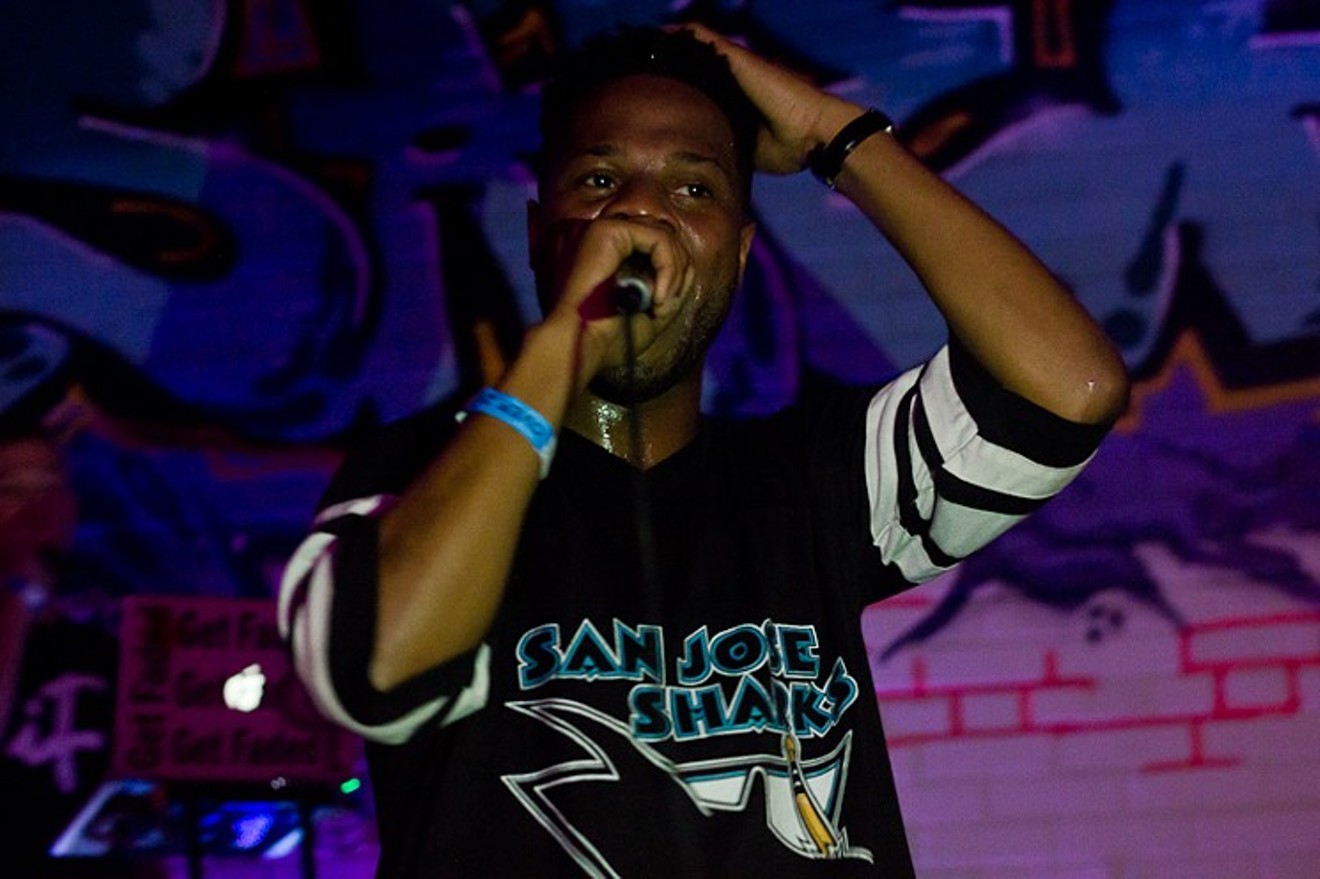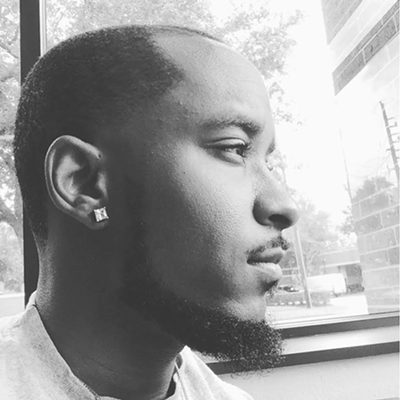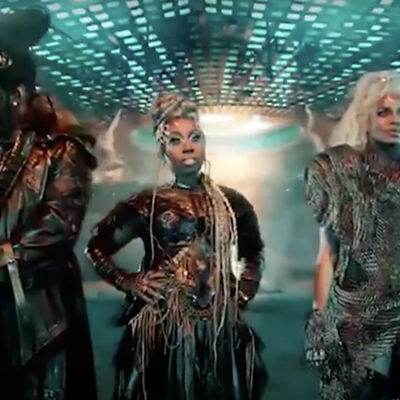MacGregor Park is tied to Houston in ways that make it feel like a sanctuary. A sprawl of grass and building that has housed dreams, first kisses, the occasional fight, tennis matches and more. Here Zina Garrison honed the skills that would later make her a world-class tennis champion. Southeast Houston hailed it as a popular Sunday-night hangout during the mid-'90s, and on Sundays now, multiple slabs dance in the sunlight. Candy paint reflects, grills are flashed, smiles abound. MacGregor Park is a South Park institution — and also a very important piece of Houston rap history.
MacGregor Park holds a multifaceted grip on southeast Houston. The first get-togethers and Sunday Fundays that became essential to the party scene emerged here. In 1985, the L.A. Rapper (again, we were terrible with rap names three decades ago) christened the park in a rap — the first Houston rap, to be specific. “MacGregor Park/ It’s where I got to be/ MacGregor Park/ My car, my freak and me,” L.A. Rapper states. The song is a collection of simplicity. There are street-name shoutouts from Old Spanish Trail to Griggs and Martin Luther King Boulevard. The beat is sinewy, a dusty collection of synths asked to live among chaotic drum programming and elevated keyboards. In 1985, the L.A. Rapper dealt with HPD the same way you or I would. All he wanted to do was be surrounded by his woman and good liquor. Oh, and keep his Zig Zags on him. A pretty simple life, and the police kept after him.
Thirty-two years later, Anthony Obi is crafting love letters to that very stretch of South Park land, the basis for one of his shortest outings ever in MacGregor Park. Our very own Fat Tony found a way to maximize 29 minutes into a sleek, 8-track rap tape. It is nearly perfect, almost Jesus, cycling through all the liquid options before flipping water into wine. It is not the absolute best rap tape to depart the Houston city limits this year; that is to be determined. However, it may be the one rap tape from the city that manages to fit an entire world into a tiny bubble of space.
In regard to inspiration, MacGregor Park for Fat Tony derives from Maco L. Faniel’s Hip Hop in Houston: The Origin and the Legacy. There’s no deeper meaning, no forced, hackneyed positioning on Tony’s behalf. Houston history gave him a piece of foundation to operate with.
Crafting an album, which went without a name for the better part of three years, allowed Tony to tinker. He could situate certain beats with ska stretches that feel like No Doubt. So much of Tony’s view of the world and hip-hop were built from traveling around the country and then some. Exiting Houston only allowed him to link with like-minded, so-called weirdos like Kool A.D, Kyle Mabson and more. He wound up on the Broad City soundtrack, and crafted one of the best tapes of the 2010s with Tom Cruz in Double Dragon and more. His 2013 album, Smart Ass Black Boy, was an extension of Houston meeting Brooklyn, Vampire Weekend flashes with clever humor and Williamsburg stylizing. MacGregor Park is not like Smart Ass Black Boy's admission of Groupon usage. MacGregor Park is not like 2010’s RABDARGAB, where Murs casually sways over a chopped-up Fat Pat sample and Kam Franklin appears but wasn’t Kam F***ing Franklin yet. MacGregor Park is as polished as Fat Tony has ever been. And it’s beautiful.
Tony normally lets his voice dance around production. It’s one of his strengths, a slick, jab-ready maneuver where he can always work from behind and win on points. “Got a dream, I ain’t finna give it up,” he chants on “Swervin’” which sounds like every slab with a decent speaker system got married to another slab with a decent speaker system and gave birth to the most beautiful Sunday night creation of all-time. Huge, sweeping bass drums and slippery keys power Tony through and he merely keeps it up throughout. That episode of him getting put through the ringer of the Michigan state police? It gets touched on briefly with “Ride Home.”
When Tony feels he's been wronged, he’ll slip into brief pontification. When he feels like The Dude, the lead hero from The Big Lebowski, he’ll casually explain to you why he’s not on a diet. Or a fan of Sonic. Or Timmy Chan’s, for that matter. Muslims and certain individuals have a “no pork on my fork” rule. Fat Tony prefers Frenchy’s in Third Ward, foremost the original one on Scott. He’ll forever hold a soft spot for Whataburger because — why would you not? And who among us has not considered taking a number from Whataburger? It is a Houston ritual at this point.
Tony’s travels across the country and south of the border have led him to sharpen one thing: his flow. At first I didn’t know what to make of it some six years ago. It was lazy, almost sloth-like. Over time, it’s picked up and found new pockets to fit in. New flows, new stanzas to stretch and try to fill. Tony never attempted to suture together 30 words to body a verse. He’s made music to suit him: an everyman who enjoys the city and expressing it across the world. MacGregor Park could have used up its short run time to plant multiple flags and be scatterbrained.
Instead, Tony gets all of his points across and leaves little to be misunderstood. The woozy and syrupy “Legal Weed” highlights how America entered prohibition around its favorite flower and subsequently blamed it on blacks, Hispanics and counterculture. The closer, a lullaby with scratchy hi hats and twisted synths, is pitch perfect. “MacGregor Park” flaunts city allegiances without any of the political or obligatory fetting: “I do it for the city/ But a nigga ain’t Drake/ Don’t think that the H is all about drank!”
Depending on how you size up the Houston rap ecosystem, Fat Tony sits in his own pond. He’s a fan of the stringent, take-no-prisoners street acts who built parts of the foundation. He’s also a fan of the younger class of Third Ward rappers who have picked up the mantle. However, you wouldn’t place him in that same class because though he’s from Third Ward and is Nigerian, he’s his own entity. He can’t consider himself directly street, nor could he consider himself a geek. Think of him as being exactly like The Dude: a low-eyed yet earnest individual who keeps the best parts of him available to the world. Most would consider it a sign of weakness.
They’ve obviously never met Anthony Obi.
Support Us
Houston's independent source of
local news and culture
account
- Welcome,
Insider - Login
- My Account
- My Newsletters
- Contribute
- Contact Us
- Sign out

Fat Tony is a man of the city — and a lover of South Park.
Photo by Francisco Montes
[
{
"name": "Related Stories / Support Us Combo",
"component": "11591218",
"insertPoint": "4",
"requiredCountToDisplay": "4"
},{
"name": "Air - Billboard - Inline Content",
"component": "11591214",
"insertPoint": "2/3",
"requiredCountToDisplay": "7"
},{
"name": "R1 - Beta - Mobile Only",
"component": "12287027",
"insertPoint": "8",
"requiredCountToDisplay": "8"
},{
"name": "Air - MediumRectangle - Inline Content - Mobile Display Size 2",
"component": "11591215",
"insertPoint": "12",
"requiredCountToDisplay": "12"
},{
"name": "Air - MediumRectangle - Inline Content - Mobile Display Size 2",
"component": "11591215",
"insertPoint": "4th",
"startingPoint": "16",
"requiredCountToDisplay": "12"
}
,{
"name": "RevContent - In Article",
"component": "12527128",
"insertPoint": "3/5",
"requiredCountToDisplay": "5"
}
]
KEEP THE HOUSTON PRESS FREE...
Since we started the Houston Press, it has been defined as the free, independent voice of Houston, and we'd like to keep it that way. With local media under siege, it's more important than ever for us to rally support behind funding our local journalism. You can help by participating in our "I Support" program, allowing us to keep offering readers access to our incisive coverage of local news, food and culture with no paywalls.
Brandon Caldwell has been writing about music and news for the Houston Press since 2011. His work has also appeared in Complex, Noisey, the Village Voice & more.
Contact:
Brandon Caldwell
Trending Music
- Top 10 Butt-Rock Bands of All Time
- The Marías Go Deep in Concert
- Chris Brown's 11:11 Tour Fills the Toyota Center
-
Sponsored Content From: [%sponsoredBy%]
[%title%]

Don't Miss Out
SIGN UP for the latest
Music
news, free stuff and more!
Become a member to support the independent voice of Houston
and help keep the future of the Houston Press FREE
Use of this website constitutes acceptance of our
terms of use,
our cookies policy, and our
privacy policy
The Houston Press may earn a portion of sales from products & services purchased through links on our site from our
affiliate partners.
©2024
Houston Press, LP. All rights reserved.





